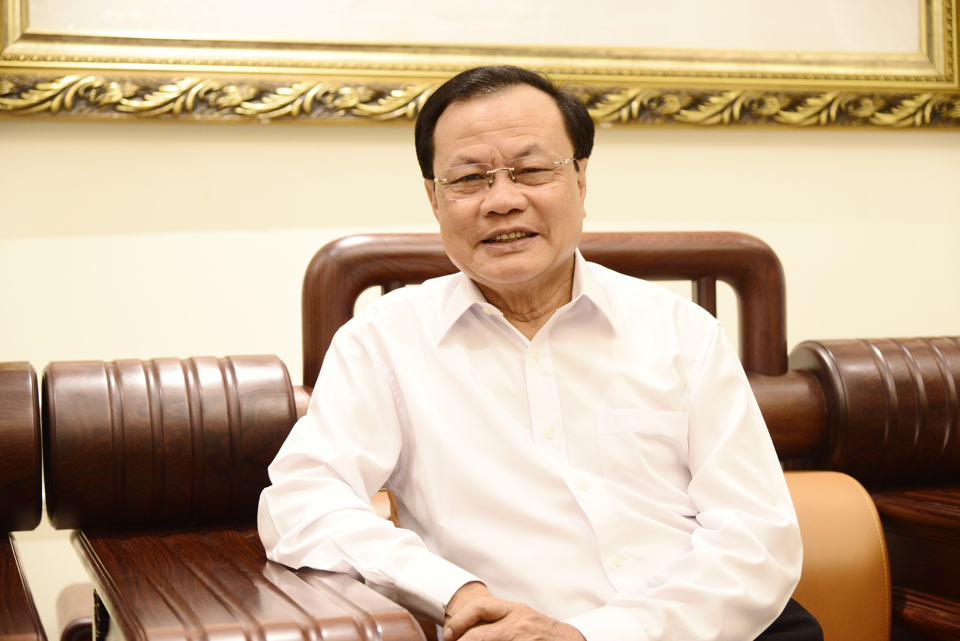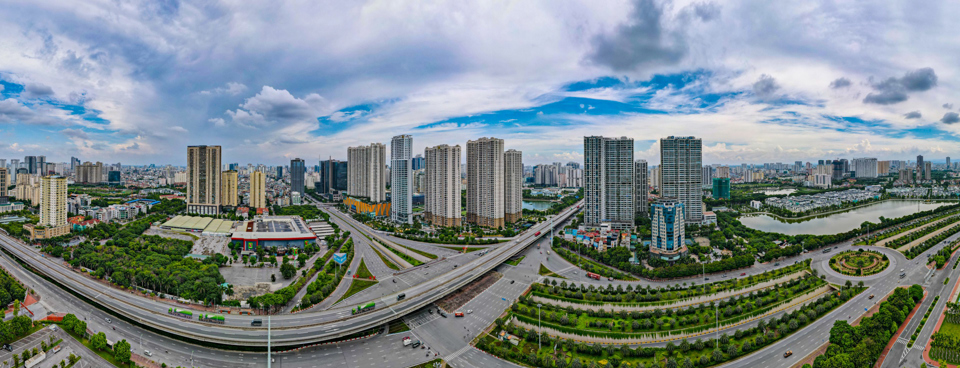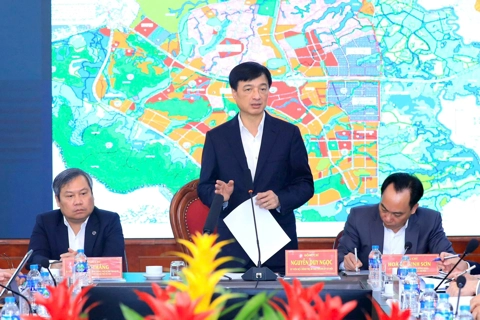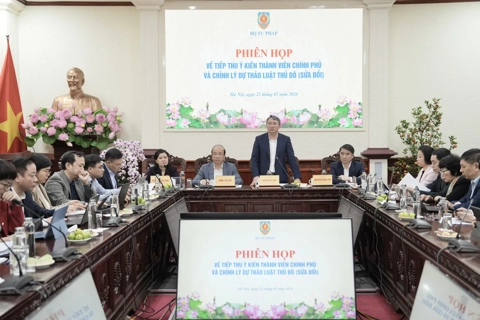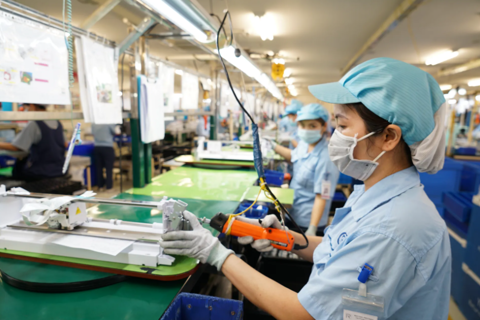Resolution 15 is conducive to Hanoi's long-term success: former city party chief
The expansion gave Hanoi much-needed space to grow into a modern, civilized capital worthy of a nation of over 100 million people.
Pham Quang Nghi, former secretary of the Hanoi Party Committee, told The Hanoi Times about the initial challenges of implementing National Assembly Resolution 15 on expanding Hanoi's administrative boundaries and its significance for the city's long-term development.
| Former Secretary of the Hanoi Party Committee Pham Quang Nghi. |
How did the Hanoi Party Committee oversee the implementation of Resolution 15 in 2008 despite the considerable challenges and workload?
In the course of implementing the National Assembly's Resolution 15, the Hanoi Party Committee faced an overwhelming and urgent workload that required round-the-clock efforts from the entire staff.
The tasks were new, challenging, and unprecedented. With the resolution taking effect on August 1, 2008, Hanoi had to quickly establish a new city-level leadership apparatus while simultaneously addressing various economic, social, defense, security, and foreign affairs in a synchronized and timely manner, with even greater urgency and efficiency than before.
In addition, Hanoi was preparing for the grand celebration of the 1000th anniversary of Thang Long - Hanoi, with numerous projects and festivities. Many were concerned about the city's ability to handle such a huge workload and organizational restructuring, involving personnel from different localities (Ha Tay Province, Me Linh District - Vinh Phuc Province, and four communes of Luong Son District - Hoa Binh Province).
Despite the initial difficulties and doubts surrounding the decision to expand Hanoi, the city leadership fostered a spirit of initiative, dynamism, and strong determination among Party cadres and members, especially at the municipal level. The emphasis on unity, cooperation, and responsibility led everyone to set aside personal benefits and work together toward common goals.
Looking back after 15 years, what is your most memorable impression of the initial phase of the implementation of Resolution 15?
The policy of expanding the administrative boundaries of the capital faced many challenges during the process of discussing and gathering opinions from various organizations and agencies.
Initially, a significant number of stakeholders, including members of the National Assembly, expressed reservations about the proposal. Concerns ranged from doubts about the management and governance capacity of the consolidated municipal apparatus to uncertainties about the unity and cooperation of the staff of the merged localities, as well as the preservation and promotion of cultural traditions.
Despite the majority approval of the National Assembly, practical difficulties remained, raising fears of possible future divisions similar to past territorial restructurings between provinces and cities.
However, these challenges also served as a driving force for Hanoi's leaders, reinforcing our determination and sense of responsibility to ensure the successful implementation of Resolution 15. The task was undeniably difficult but crucial.
Looking back, those were indeed memorable days for me.
| Hanoi from above. Photo: Hoang Ha/The Hanoi Times |
What is your personal view of the city's current comprehensive transformation, which includes economic growth, cultural diversity, and improvement of people's lives?
In reality, the remarkable development and transformation of Hanoi since the expansion of its administrative boundaries confirms the correctness of this policy. Enlargement provided the much-needed space for Hanoi to flourish and develop into a modern and civilized capital, befitting a nation of over one hundred million people.
After the expansion, Hanoi has maintained a high growth rate, consolidating its leading position and serving as a driving force for the development of the Northern Key Economic Zone. The city's economic weight within the country has also increased significantly. In particular, the per capita income in terms of GDP reached VND141.8 million (US$5,950) in 2022, a considerable increase compared to the national average (US$4,110) and a significant rise from 2008, when it was VND37.4 million (US$1,697).
This economic growth has been instrumental in raising the living standards of its residents.
The expansion has also brought about a remarkable transformation in both the urban and rural areas of Hanoi. The city's urban landscape has become greener, more sophisticated and modern with the emergence of new urban areas, ring roads, radial roads and major bridges.
Investments in rural areas have addressed imbalances and disparities in living standards and incomes between rural and mountainous areas. As a result, the countryside has experienced positive changes, embracing modernization while preserving and promoting traditional cultural values.
At present, Hanoi boasts a remarkable achievement: all communes, 15 out of 18 districts and villages meet the new-style rural standards.
These achievements are a testament to the city's commitment to sustainable development and its dedication to fostering thriving communities in both urban and rural landscapes.
In terms of international integration, Hanoi has solidified its position by fostering friendly and cooperative relations with over 100 capitals, cities, regions and localities worldwide.
Hosting numerous large-scale economic and cultural events every year, the city has received high praise from its international counterparts. Hanoi holds the prestigious title of "City for Peace" and is the first place in Vietnam to be recognized by UNESCO as a member of the "Creative City Network". In addition, the city is actively pursuing the development of a "smart city", demonstrating its progress and innovation.
Despite these strong development steps, the rapid urbanization process has created challenges for Hanoi. The insufficient competence of the city's staff has left consequences and difficulties, especially the imbalance of urban development.
The growth of social infrastructure has not kept pace with the increase in housing and population, resulting in a shortage of schools in certain areas. In addition, the condition of many old residential buildings is deteriorating, requiring renovation and construction efforts that have yet to be fully addressed.
There are still shortcomings in the management of construction orders and planning. Cultural and behavioral issues among Hanoians are also areas that require attention.
Addressing these challenges will require a collective effort, with both the city and central ministries and agencies sharing responsibility. For example, the relocation of ministries, hospitals, and universities from downtown Hanoi needs to be accelerated, with vacated offices handed over to the city after relocation. A more robust decentralization approach by the central government is essential, granting Hanoi the autonomy to implement mechanisms, policies, and powers commensurate with its position and role as the capital. This collaborative approach will enable Hanoi to address the issues raised and make faster and better progress.
In view of Politburo's Resolution 15 on Hanoi's development goals up to 2030, what are the key issues that the city needs to prioritize and address in the future?
The most important issue for building, protecting, and developing Hanoi as an increasingly civilized and modern capital is to recognize its core position, role, obligations, powers, and responsibilities. Hanoi is the national political-administrative center; the cultural, scientific, educational, economic, and international hub of the country, rooted in a rich heritage of thousands of years.
Despite the importance of this role, Hanoi has lacked specific and appropriate mechanisms and policies to fulfill its obligations. In the past, some viewed Hanoi simply as a first-tier national city, which hindered the development and management potential of the capital.
To address this, the amended Capital Law emphasizes that Hanoi is the capital of the entire nation.
The revised law should meet the aspirations of a country of over 100 million people with a proud historical and cultural heritage while addressing the immediate and long-term needs of developing a civilized and modern capital.
By providing Hanoi with exceptional and tailor-made mechanisms, policies, obligations, powers and responsibilities commensurate with its role as the national capital, Hanoi can effectively achieve the goals outlined in Politburo Resolution 15. This is not only for the benefit of Hanoi City or its authorities and residents but rather for the greater benefit of the entire country, meeting the expectations and demands of all citizens for their capital.
Thank you for your time!


